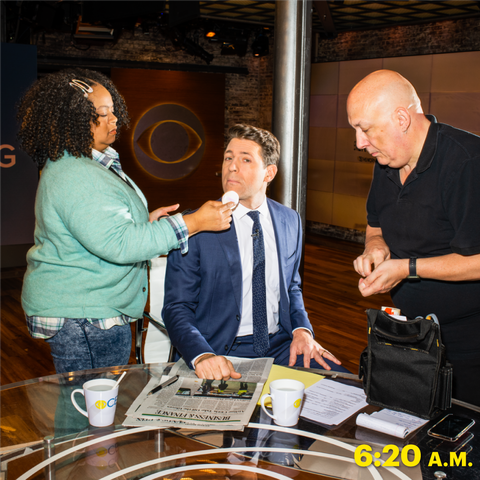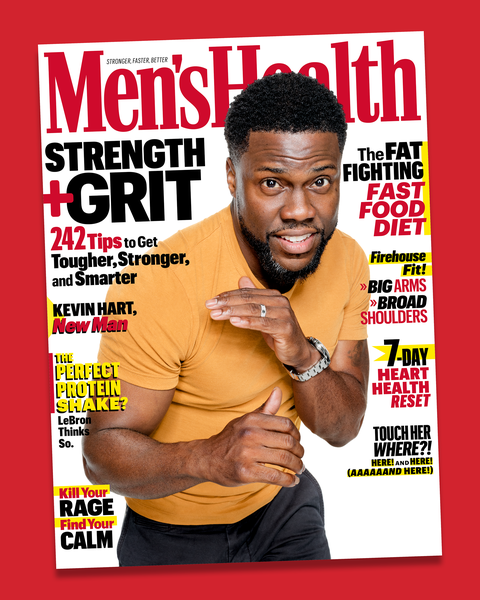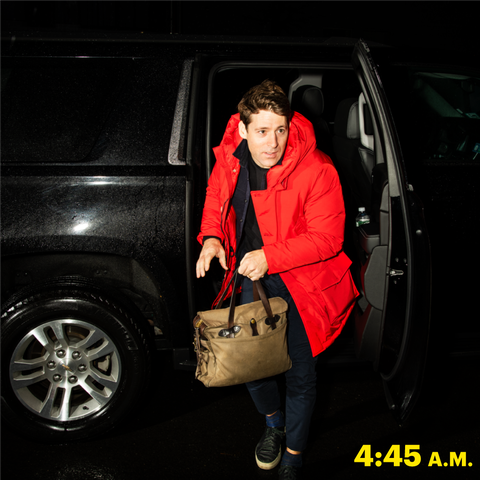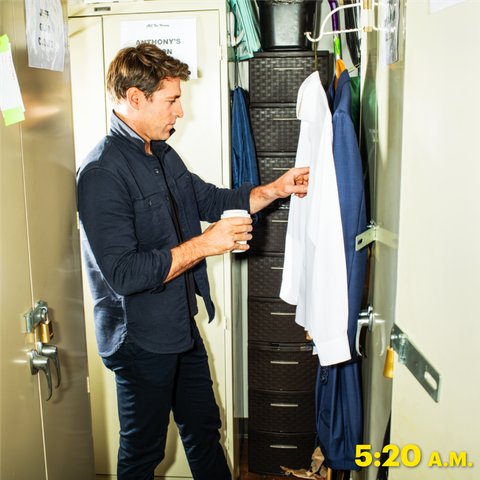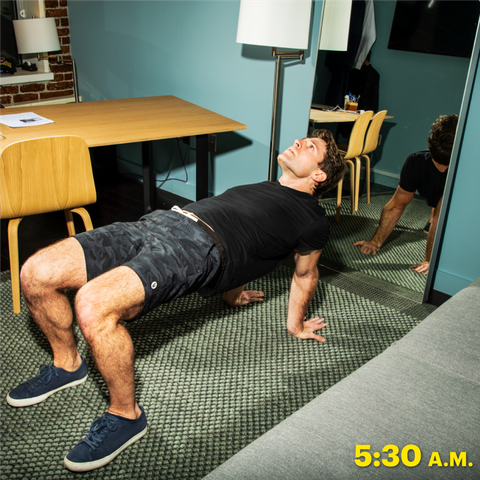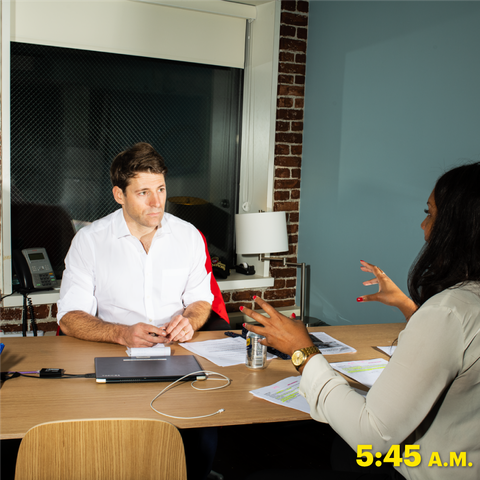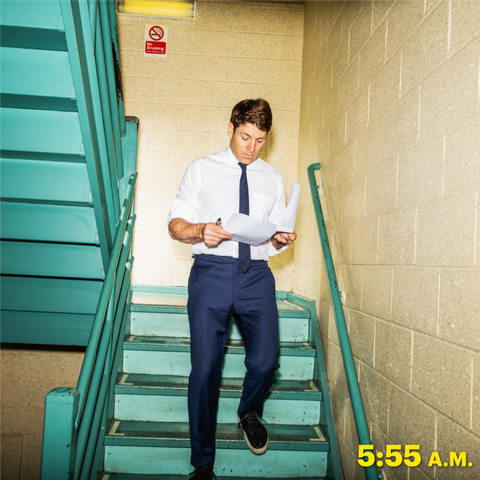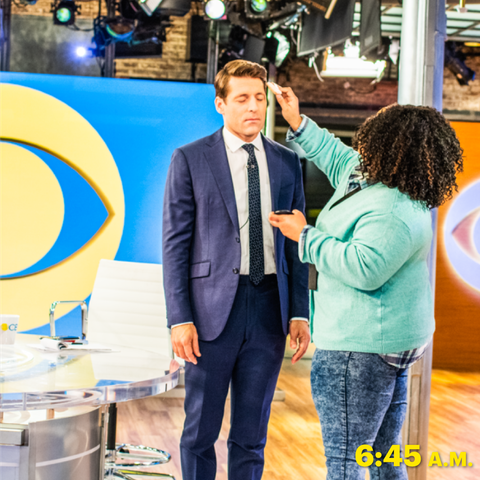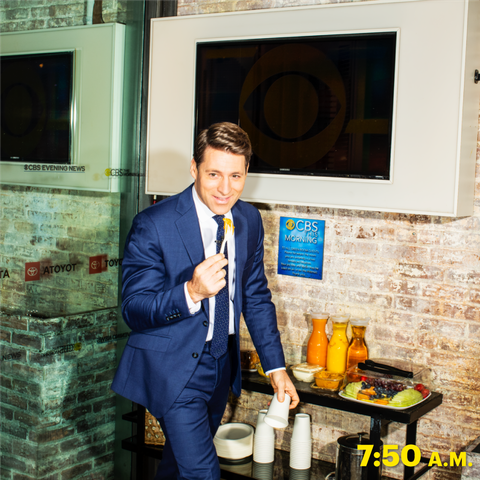Tony Dokoupil Isn't a Morning Person. He Just Plays One on TV.
Brian Finke
I UNDERSTAND THAT the world would probably like me to say, “I’m a morning person.” I cohost a morning news show, after all. It’d be a comfort to learn I get up at 4:00 a.m. every day—when presumably you do not—because I’m somehow “wired for it.” I’m a sparrow, not an owl, or whatever is the best bird metaphor.
.
Subscribe to Men’s Health
SHOP NOW
Except it’s just not true. At my first early-morning job, mowing a golf course at 5:00 a.m., I used to fall asleep behind the machine, chopping into the collar of the green, until I got fired. At my second early-morning job, at a Wendy’s in upstate New York, I’d catnap in the freezer, only to wake up with cold eyelids, until I quit. And in my decade as a print reporter, I never, ever got up early, unless I had to catch a flight or care for a baby.
The hard truth: This is a brutal schedule. I get about five hours of sleep per weeknight, because going to bed before 10:30 p.m. isn’t great for your marriage and I need to put in some work for the next day’s show. I’m perpetually sleep deprived, but that can be weirdly great—like the way two beers can turn you into a better pool player. Simply commit to never making a life-changing decision after 3:00 p.m. and get a morning routine. Here’s mine:
4:00 a.m. | Wake Up
THE FIRST THING I do is turn off the backup alarm on my wife’s phone, except of course when I forget and it wakes up the house while I’m singing in the shower. We have an infant, so I always make sure the baby’s okay. Then I head to the kitchen to pour a homemade cold brew, even in the winter. It’s a big, quick, thirst-quenching dose of caffeine—I fill a 16-ounce mason jar to drink about 150 milligrams total before showtime at 7:00 a.m. Cut that with a splash of cream and that’s it for food until about 8:00 a.m.
Yeah, yeah—I know what the experts say about breakfast. I also know that eating before dawn feels like the end of a long night, not the start of a productive day. I’d go into hibernation mode on the kitchen floor.
4:15 a.m. | Start Prepping
IN THE BATHROOM, I scan emails for anything urgent and open WhatsApp to see if my older kids sent me anything overnight. They’re ten and seven and live in Tel Aviv during the school year. (It’s a long story.) When everyone is asleep in America, even an emoji feels like company, especially sent by someone you .
“I tell myself that ‘slow is smooth, and smooth is fast.’ It keeps my head in the moment.”
From then on, it’s cram time. I listen to news podcasts while I shave and weed-wack my ear and nose hair. (Dude, check yourself out.) After a quick shower, I’ll sometimes write my wife a little love note and leave it on her mirror. It’s a way to wake up together even when you don’t wake up together. At the very least, I stumble-trip back into our room for a kiss goodbye—and to pick up my dirty laundry from the night before, because lessons have been learned.
Brian Finke
4:45 a.m. | In the Car
I HIT THE company car in street clothes, usually jeans, a T-shirt, and some sort of shirt jacket. No coffee on the ride—I switch to water so I can at least pretend to be hydrated.
A warm, waiting car and driver is super nice, let’s be clear. But it’s also productive. So here’s a little secret: I warm up my voice in the car. The exercises are ridiculous. There’s one for resonance. (Basically you vibrate your voice enough to feel it in your lips and, among other things, moo like a cow.) There’s one for dexterity with S and Z sounds. (You say things like “neat . . . seat” and “gnat . . . sat” and hold the positions before switching words.) And there are the tongue twisters everyone likes.
The most famous among stage people is probably “Amidst the mists and coldest frosts / With barest wrists and stoutest boasts / He thrusts his fists against the posts / And still insists he sees the ghosts.” I sound like a cross between an off-Broadway Muppet Show and Will Ferrell from Anchorman, but these really do help.
It turns out the voice is a muscle. When I jumped from writing to broadcasting, I knew my voice needed work. Now I swear by these warmups—and if you’ve got a lot of presentations in your life, maybe you should, too. They aren’t going to turn you into James Earl Jones, but you might stop sounding like the kid the teacher called on by surprise. Anyway, I always finish by 5:08 a.m. to catch Morning Edition on NPR.
Brian Finke
5:15–5:30 a.m. | In the Office
I ALWAYS TAKE the studio stairs instead of the elevator, because it’s just one floor and because I’m a slight freak about stairs: I like to control the pace, and I like to avoid that press ’n’ stare pose of phone scrolling that happens outside elevators. I get too sucked into my device.
Brian Finke
Once in my office, I drop my bag and head to wardrobe, where I pick up my suit right away. Back in my office, I hang the suit and change into some workout clothes for a mortifying 15 minutes or so of light exercise. It’s definitely amateur hour: leg swings, arm circles, planks, pushups, backbends, Supermans. But my philosophy on exercise is “often and brief.” I feel like the mind is part of the body. I can’t think unless I‘m warm.
Brian Finke
5:45 a.m. | Briefing Time
EVERY MORNING, we have our own briefing sheets to read but also do a verbal walk-through of the show—what’s on, when, and where there might be tricky transitions. Plus, we talk guests. What do we want to ask them? What’s most interesting? I use this window to jot a few notes to myself—little ideas that might work to button up or build out a segment.
Hosting a morning show feels a lot like hosting a dinner party: People arrive and tell their stories, and your job is to keep things moving along without anyone yawning or fighting.
Brian Finke
6:00 a.m. | Moment of Zen
WE STILL GET a stack of newspapers every morning, and just before I head to set, I paw through it and read a couple articles that have nothing to do with our show. It reminds me that the world is large and old and no one knows it all. I’ll even underline a phrase or two as I read. It gives everything the feel of a weekend or a slow breakfast, waiting for a couple friends to arrive, which is a pretty good mood for a morning show.
Brian Finke
6:15–6:30 a.m. | Makeup and Call Time
I USED TO insist that I do my own thing but now give myself over to the talents of the hair-and-makeup team. They’re capable of almost completely erasing the haggard, sallow look of fatherhood and making my outside appear alert even if my brain is a little foggy. And a note about that: Sleep deprivation is real and cumulative, and there’s no solution other than shut-eye. But I do have a trick for when I’m feeling a little extra bleary—after, say, shooting a story in San Francisco before flying on a red-eye home and going straight to set. I tell myself that “slow is smooth, and smooth is fast.”
I learned this from a special operations weather team airman, aka SOWT (pronounced SOW-TEE). I did a big, immersive piece with these guys. They are U. S. Air Force special tactics officers who attach to Navy SEAL and Army Ranger teams for spot weather and terrain analysis. I think the phrase is used throughout special operations.
It keeps my head in the moment. And what a moment it is: We pretape some headlines, but the show is all live, and once the red light goes on, there’s no such thing as a pause button.
Brian Finke
7:50 a.m. | Midshow Break
REMEMBER MY no-breakfast rule? Well, I break it after our first hour, with a couple spoons of peanut butter taken from a spread in the greenroom, which is where all our guests hang out before going on-air. On our best days, the place feels like a clubhouse for the country’s most interesting people, and I wander in for the peanut butter. It isn’t a pretty choice, or a wise one, given that I can’t have it stuck to the roof of my mouth on camera. But it’s the only thing I’d call a superfood.
Besides, at 9:00 a.m., when the show is over, the rest of my day begins—with shoots, scripts, and the many small domestic fires of daily life. Some days I’m not done until it’s time to do it all over again. There are few things better than sleep. But this job is one of them.
Source: Read Full Article
